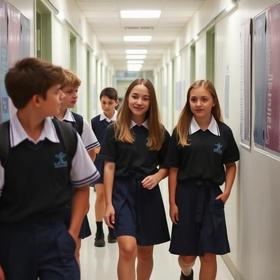Top Rankings
Lennox School District ranks among the top 20% of public school district in California for:
Category
Attribute
Community Size
Largest student body (number of students) (Top 1%)
For the 2026 school year, there are 6 public elementary schools serving 4,037 students in Lennox School District. This district's average elementary testing ranking is 5/10, which is in the bottom 50% of public elementary schools in California.
Public Elementary Schools in Lennox School District have an average math proficiency score of 28% (versus the California public elementary school average of 36%), and reading proficiency score of 38% (versus the 45% statewide average).
Minority enrollment is 100% of the student body (majority Hispanic), which is more than the California public elementary school average of 79% (majority Hispanic).
Overview
This School District
This State (CA)
# Schools
6 Schools
7,693 Schools
# Students
4,037 Students
3,823,192 Students
# Teachers
201 Teachers
174,001 Teachers
Student-Teacher Ratio
20:1
20:1
Student By Grade
District Rank
Lennox School District, which is ranked #1036 of all 1,908 school districts in California (based off of combined math and reading proficiency testing data) for the 2022-2023 school year.
The school district's graduation rate of 99% has increased from 95% over five school years.
Overall District Rank
#1018 out of 1932 school districts
(Bottom 50%)
(Bottom 50%)
Math Test Scores (% Proficient)
28%
34%
Reading/Language Arts Test Scores (% Proficient)
38%
47%
Science Test Scores (% Proficient)
21%
29%
Graduation Rate
(21-22)≥99%
87%
Students by Ethnicity:
Diversity Score
0.07
0.64
% American Indian
n/a
1%
% Asian
1%
12%
% Hispanic
96%
55%
% Black
1%
5%
% White
n/a
21%
% Hawaiian
n/a
n/a
% Two or more races
2%
6%
All Ethnic Groups
District Revenue and Spending
The revenue/student of $23,564 is higher than the state median of $19,974. The school district revenue/student has grown by 32% over four school years.
The school district's spending/student of $17,347 is less than the state median of $18,395. The school district spending/student has stayed relatively flat over four school years.
Total Revenue
$95 MM
$116,387 MM
Spending
$70 MM
$107,188 MM
Revenue / Student
$23,564
$19,974
Spending / Student
$17,347
$18,395
Best Lennox School District Public Elementary Schools (2026)
School
(Math and Reading Proficiency)
(Math and Reading Proficiency)
Location
Quick Facts
Rank: #11.
Dolores Huerta Elementary School
(Math: 43% | Reading: 46%)
Rank:
Rank:
7/
Top 50%10
4125 West 105th St.
Inglewood, CA 90304
(310) 677-7050
Inglewood, CA 90304
(310) 677-7050
Gr: K-5 | 551 students Student-teacher ratio: 23:1
Rank: #22.
Buford Elementary School
(Math: 39% | Reading: 40%)
Rank:
Rank:
6/
Top 50%10
4919 West 109th St.
Inglewood, CA 90304
(310) 680-8900
Inglewood, CA 90304
(310) 680-8900
Gr: K-5 | 525 students Student-teacher ratio: 21:1
Rank: #33.
Jefferson Elementary School
(Math: 38% | Reading: 37%)
Rank:
Rank:
6/
Top 50%10
10322 Condon Ave.
Inglewood, CA 90304
(310) 680-5650
Inglewood, CA 90304
(310) 680-5650
Gr: K-5 | 737 students Student-teacher ratio: 22:1
Rank: #44.
Moffett Elementary School
(Math: 27% | Reading: 38%)
Rank:
Rank:
5/
Bottom 50%10
11050 Larch Ave.
Inglewood, CA 90304
(310) 680-6200
Inglewood, CA 90304
(310) 680-6200
Gr: K-5 | 661 students Student-teacher ratio: 22:1
Rank: #55.
Felton Elementary School
(Math: 31% | Reading: 32%)
Rank:
Rank:
5/
Bottom 50%10
10417 Felton Ave.
Inglewood, CA 90304
(310) 680-8950
Inglewood, CA 90304
(310) 680-8950
Gr: K-5 | 370 students Student-teacher ratio: 19:1
Rank: #66.
Lennox Middle School
(Math: 20% | Reading: 38%)
Rank:
Rank:
4/
Bottom 50%10
11033 Buford Ave.
Inglewood, CA 90304
(310) 419-1800
Inglewood, CA 90304
(310) 419-1800
Gr: 6-8 | 1,193 student Student-teacher ratio: 17:1
Recent Articles

Zero Tolerance Policies in 51±¬ÁĎs Today
An updated look at zero tolerance policies in public schools, including current trends, costs, legal concerns, and what parents need to know now.

The Pros and Cons of Tracking in Schools Today
Explore the advantages and drawbacks of academic tracking in today’s public schools, including equity, outcomes, and what parents should consider.

Budgeting Hidden Costs of 51±¬ÁĎing in 2026
Learn how families budget for school lunch, after-school care, and activities, the hidden costs of public schooling in 2026.





